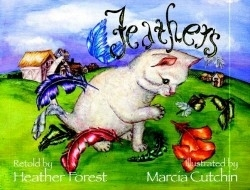Feathers
In a small village, a young woman spreads an unkind rumor. Her victim goes to the village rabbi to get justice for her ruined reputation. The gossipmonger offers to make amends by taking back her words, demonstrating that she does not truly understand the harm she has caused. The rabbi invents a creative way to teach the heedless woman the destructive power of rumors and gossip.
He tells her: “Take my feather pillow to the market square. Cut it open and let the feathers fly through the air. When this task is done, bring back the feathers, every one.” Although she thinks the rabbi has gone mad, she follows his strange instructions. Of course, she cannot possibly retrieve all the feathers, and thus learns the intended lesson: “‘I suppose,’ she sighed as she lowered her head, ‘they are like the words I can’t take back from the rumor I spread.’”
The author is a storyteller and folk musician with several recordings, and has written four other picture books, including a version of Stone Soup that won a Parent’s Choice Award, plus A Big Quiet House, which was selected for the American Bookseller Pick of the List. She attributes the origin of this tale, which she tells in rhymed verse, to Levi Yitzhak of Berdichev, an eighteenth-century Hassidic rabbi from Eastern Europe. Spiritual teachers have long known the power and effectiveness of using parables to teach moral lessons, and this one is especially vivid, although the verses are uneven in rhythm and inconsistent in rhyme.
What makes this volume remarkable are the illustrations. The illustrator teaches art at an elementary school in Florida and works as a freelance graphic artist. This is her first picture book, and in it she has used a watercolor palette that is vibrant and rich, clearly depicting the expressions of the villagers, the smugness of the young yenta, and the wise eyes of the old rabbi. The feathers that fly out of the pillow and over the village rooftops are beautiful, bright, and surprisingly multi-colored, like the varied feelings that words can evoke.
Intended for ages five through eight, Feathers will inspire discussions about the emotional power of words, as well as about the bygone culture of the setting. Forest ends the book by stating its lesson: “Cruel words like feathers fly. Cruel words reach far and wide. They leave the mouth a bitter rind. May all your words, my friends, be kind.”
Reviewed by
Karen McCarthy
Disclosure: This article is not an endorsement, but a review. The publisher of this book provided free copies of the book to have their book reviewed by a professional reviewer. No fee was paid by the publisher for this review. Foreword Reviews only recommends books that we love. Foreword Magazine, Inc. is disclosing this in accordance with the Federal Trade Commission’s 16 CFR, Part 255.

